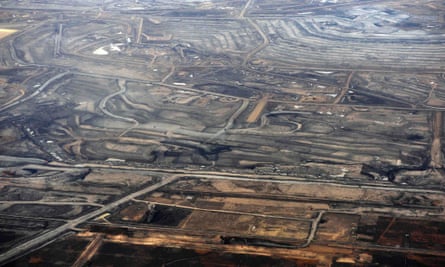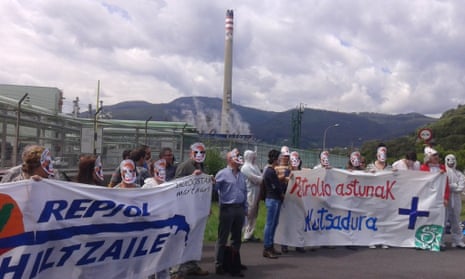A cargo believed to be Europe's first major shipment of tar sands oil arrived in Spain this week, as European policymakers proposed scrapping the requirement that such oil be labeled as more polluting than other forms of crude.
570,000 barrels of Western Canada Select heavy blend crude, originally from Canada, arrived in Spain's port of Bilbao in the middle of this week, said a spokesman for Repsol.
The shipment, which he said was a first for the Spanish oil and gas company, is part of a pilot project to test the capacity of its refineries to process the heavy grade crude.
"We're trying to give a future for oil refining in Europe, where many refineries have been shutting down in recent years," he said. "We share environmental concerns but we think the solution is in efficiency and technology."
Producing oil from tar sands generates higher greenhouse gas emissions than conventional oil. It has also been criticised for the amount of water needed to extract it.
In anticipation of the shipment, Spanish environmentalists held a protest at the port of Bilbao last week. Mariano González of Ecologists in Action said "this was a good occasion to raise awareness about what's happening and express our disapproval.
The group is planning to continue its protests. "That was just our first action in coordinating a rejection of the entry of this type of oil into Europe," he told the Guardian.
The fact that this week's cargo is a test shipment, he said, gave a sense of urgency. "It's likely that if the EU doesn't do something, tar sands oil will start to arrive in massive quantities to Europe."

Currently Europe imports about 4,000 barrels per day of tar sands oil, he said. A report by US-based green group, the Natural Resource Defense Council, estimated that current imports of tar sands oil could skyrocket to more than 700,000 barrels per day by 2020 if planned pipelines in the US and Canada are approved and built.
Reports emerged this week that European policymakers are poised to do away with the methodology that would have seen fuels derived from tar sands labeled as more polluting as compared to conventional forms of crude.
The fuel quality directive, approved by EU member states in 2009, mandates a 6% reduction in greenhouse gas emission from fuel by 2020. One proposal to achieve this goal was to designate oil from tar sands as 25% more polluting as compared to other forms of crude.
The Canadian government has spent years lobbying against the proposal, arguing that it unfairly singles out Canadian crude. EU member states failed to reach an agreement over the proposal.
According to a draft document seen by Reuters, EU policymakers have proposed changes to the directive that would require companies to report an EU-wide average of the emissions for raw materials, rather than having fuel suppliers divulge the carbon footprint for the original crude oil used to make their product. The changes could eliminate potential hurdles for Canada in selling tar sands oil to Europe.
Speaking to reporters after G7 talks in Brussels this week, Canadian prime minister Stephen Harper didn't mention by name the changes, but pushed the idea that Europe should be embracing oil from Canada as a secure source of energy, particularly given the crisis in Ukraine.
"We don't see the crisis in Ukraine as simply an opportunity to market Canadian products, but obviously we're deeply engaged in an discussion with our allies on how we can make sure that globally our energy supplies are secure and stable," said Harper.
The changes to the fuel quality directive are still being discussed by the EU executive, reported Reuters. The final directive is expected to be published next month and then must be approved by EU member states and the parliament.

Comments (…)
Sign in or create your Guardian account to join the discussion